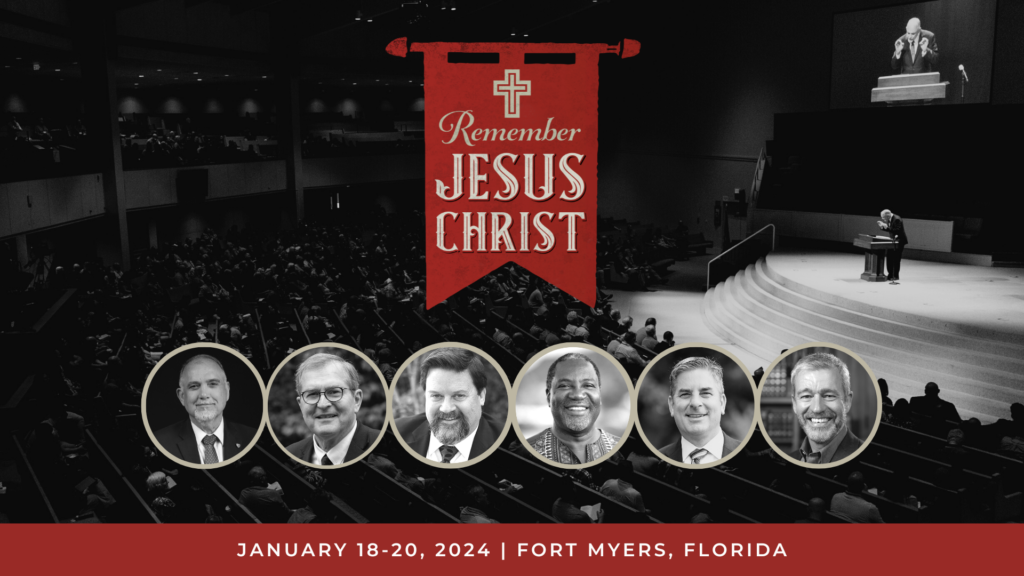This article is part 3 in a series by Tom Nettles on Remembering Jesus Christ. You can read part 1, and part 2.
The gospel was no matter of human construction, nor a philosophy to be shaped by critical interaction. It was not Paul’s gospel in the sense that he deduced it from a clever, or even a profound, integration of secular cultural ideals. He did not invent it nor construct it by logical extension from his thorough knowledge of the Old Testament Scriptures. His gospel was indeed the culmination of the Holy Scriptures and the perfect and intended fulfillment of their meaning in historical narrative, prophetic utterance, typological events and persons, wisdom literature, and worship material. He told Timothy that the “Holy Scriptures … are able to make you wise for salvation through faith which is in Christ Jesus” (2 Timothy 3:15). These Scriptures, which Timothy had been taught from childhood by Lois his grandmother and Eunice his mother were to be seen in their perfect meaning when he viewed them in light of “the things which you have learned and been assured of, knowing from whom you learned them” (2 Timothy 3:13). Paul referred to his own instruction, for Timothy had “carefully followed my doctrine” (2 Timothy 3:10). What Paul called “my doctrine” here, he had called “my gospel” a few paragraphs earlier.
In Romans 1, Paul begins describing his ministry, indeed his authority, to the Romans, immediately dictating, “Paul, a bond-servant of Christ Jesus, called as an apostle, set apart for the gospel of God.” He then summarized this gospel in terms virtually synonymous with our text: “which he promised beforehand through His prophets in the holy Scriptures, concerning His Son, who was born of a descendant of David according to the flesh, who was declared the Son of God with power by his resurrection from the dead, according to the Spirit of holiness, Jesus Christ our Lord.” Then he adds the particular idea we are considering, “through whom we have received grace and apostleship,” or perhaps, “this particular grace of apostleship.” He goes on to say, in light of the large Gentile admixture in the church at Rome, “to bring about the obedience of faith among all the Gentiles for His name’s sake” (Romans 1:1-5). As Paul closed Romans, he told the church that God “is able to establish you according to my gospel, even the preaching of Jesus Christ.” His gospel was the “revelation of the mystery kept secret since the world began.” Though kept hidden as to the kind of person who could fulfill all the requirements of prophecy, who could judge justly and yet forgive sins and remove them as far as the east is from the west, in that revelation it was “made manifest.” Then in a way perfectly consistent with the Scriptures of the prophets, this gospel that he calls “my gospel” was “made known” to the nations.
Similarly, to the Ephesians he wrote that “this grace was given that I should preach among the Gentiles the unsearchable riches of Christ” (Ephesians 3:8). The gospel that he preached carried the authority of his apostleship, his independent understanding of the gospel of Christ revealed to him: ”that by revelation there was made known to me the mystery” (Ephesians 3:3). As he told Timothy, this gospel now constitutes a part of the Holy Scripture (2 Timothy 3:16) and brings all of its parts into perfect harmony. By the gospel certain mysteries that lingered in the prophets were given clarity. Peter referred to this in 1 Peter 1:10-12, asserting that “those who preached the gospel to you by the Holy Spirit sent from heaven” gave clarity to both “the sufferings of the Messiah and the glories that would follow.” Mysteries left buzzing in the heads of the prophets found their resting place in “Jesus Christ, risen from the dead, of a seed of David.” Paul goes on to tell the church in Ephesus about his “insight into the mystery of Christ” that was not made known in previous generations but “has now been revealed to his holy apostles and prophets in the Spirit” (Ephesians 3:4, 5). Of this gospel God’s powerful grace made Paul a minister, a steward of the revealed truth concerning “the unfathomable riches of Christ” (Ephesians 3:7, 8).
When among the church at Corinth false teachers came who taught that there is no such thing as a resurrection of bodies, Paul began his instruction with a strong assertion of the absolute truthfulness of the gospel that he had preached. By his gospel they would be saved; if his gospel was not true, their faith would be empty. Note how insistent he is on the certainty of his message. To counteract these heretics, Paul reviewed “the gospel which I preached to you” and asserted the certainty of their salvation “if you hold fast the word which I preached to you” (1 Corinthians 15:1, 2). What did he preach? “I delivered to you as of first importance what I also received.” From whom did he receive this message that he preached? As he argues throughout his corpus of letters, he received it by divine revelation so that his gospel was for certain the gospel of God.
The first necessary theological truth is precisely this: preaching by an apostle. “So we preached and so you believed. Now if Christ is preached, that He has been raised from the dead, how do some among you say that there is no resurrection of the Dead?” (11, 12). Preached, therefore believed. If taught otherwise than preached by an apostle, the message is false, even without further investigation. Other doctrinal ideas of major importance are eventually discussed—forgiveness of sins, the conquering of death, the reigning of the man from heaven—but it is striking that the first thing Paul mentioned is the unity of the apostolic witness on this issue. Only a revelation could accomplish such unanimity.
If unalterably true as Paul claimed, his gospel would bear the scrutiny of critical examination in places where it touched on matters open to investigation. True belief, however, would arise in the context of the apostolic word, not the scrutiny. The resurrection of Christ and the consequent resurrection of believers were unambiguous facts of this divine revelation. The divine grace that captured him, making him an apostle, also confirmed to him the content of the gospel that he preached. His gospel, as revealed to him by the Holy Spirit, was a message of salvation grounded both in Scripture and in history. “Christ died for our sins according to the Scriptures” (1 Corinthians 15:3). “Christ died” was historical; “for our sins” was theological, a matter of divine revelation and in perfect harmony with the prophetic words, “The Lord has laid on him the iniquity of us all; … he bore the sins of many” (Isaiah 53:6, 12). “That he was buried, and that he was raised on the third day according to the Scriptures,” relates two historical facts—buried, raised—that Paul proceeds to verify by historical evidence—multiple eyewitnesses of the risen Christ—including his own remarkable conversion and call to preach (1 Corinthians 15:5-10). Then with the historical evidence he interweaves truths of consistent biblical witness such as the Lord Messiah would be seated at the right hand of the Lord “till I make your enemies your footstool” (Psalm 110:1). Also, he would come in power as the “Son of man, coming on the clouds of heaven” and would be given “dominion and glory and a kingdom” (Daniel 7:13, 14). Only the resurrection of the crucified Messiah can explain such events.
In his letter to the churches of Galatia, Paul was shocked and amazed that someone could come among them, preaching a supposed gospel other than what Paul preached, and actually be credited as truthful. Paul had no room for suavity, politeness, or deference on this issue but instead said in no uncertain terms, “If we, or an angel from heaven should preach to you a gospel contrary to what we have preached to you, accursed be him” (Galatians 1:8). Why is Paul so certain of the correctness of his anathematization? “The gospel which was preached by me is not according to man. For I neither received it from man, nor was I taught it, but I received it through a revelation of Jesus Christ” (Galatians 1:11, 12). Paul had no doubts that his gospel was THE gospel; he had no doubt that his gospel was the same as that preached by the other apostles; he had no doubt that he received his gospel by divine revelation.
“Remember Jesus Christ, risen from the dead, out of a seed of David, according to my gospel” (2 Timothy 2:8).
This article is part 3 in a series by Tom Nettles on Remembering Jesus Christ.
Join us at the 2024 National Founders Conference on January 18-20 as we consider what it means to “Remember Jesus Christ” under the teaching of Tom Ascol, Joel Beeke, Paul Washer, Phil Johnson, Conrad Mbewe and Travis Allen.
























